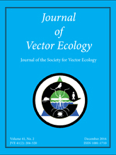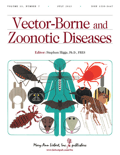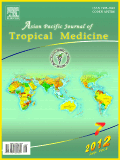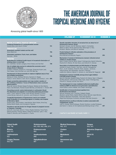
JOURNAL OF VECTOR BORNE DISEASES
Scope & Guideline
Bridging gaps in understanding vector-borne diseases globally.
Introduction
Aims and Scopes
- Epidemiology of Vector-Borne Diseases:
Research on the distribution, determinants, and dynamics of vector-borne diseases, including malaria, dengue, and leishmaniasis, in various geographical contexts. - Vector Biology and Ecology:
Studies investigating the biology, ecology, and behavior of vectors such as mosquitoes and ticks, including their role in disease transmission. - Control Strategies and Interventions:
Evaluation and development of innovative strategies for vector control, including the use of insecticides, biological control agents, and public health initiatives. - Molecular and Diagnostic Techniques:
Application of molecular techniques for the detection and characterization of pathogens and vectors, enhancing the understanding of disease transmission. - Impact of Climate and Environmental Factors:
Research on how environmental changes and climatic factors influence vector populations and the transmission dynamics of vector-borne diseases. - Public Health and Socioeconomic Aspects:
Exploration of the public health implications of vector-borne diseases, including community knowledge, attitudes, and practices.
Trending and Emerging
- Artificial Intelligence and Machine Learning Applications:
The integration of AI in the repurposing of herbs for therapy and predictive modeling for vector control is emerging as a significant trend. - Climate Change and Vector Dynamics:
Research exploring the impact of climate change on vector behavior and disease transmission is gaining traction, highlighting the need for adaptive strategies. - Multi-Pathogen Interactions:
Emerging studies on co-infections, such as dengue and malaria, are becoming more prominent, reflecting the complex nature of vector-borne diseases. - Innovative Control Strategies:
There is an increasing focus on novel control strategies, including the use of biological control agents and environmentally friendly insecticides. - Public Health Response and Community Engagement:
Research emphasizing community involvement and educational interventions in vector control efforts is increasingly being published, recognizing the importance of social factors.
Declining or Waning
- Traditional Vector Control Methods:
Research on conventional methods such as fogging and residual spraying has decreased as new strategies and biological controls gain prominence. - Non-Viral Zoonotic Diseases:
There is a noticeable reduction in papers focusing on non-viral zoonotic diseases, suggesting a shift towards viral infections like dengue and chikungunya. - General Vector Surveillance:
General studies on vector surveillance have declined as more targeted and sophisticated methodologies, such as molecular xenomonitoring, are being favored. - Insecticide Resistance Studies:
While still relevant, there is a decreasing trend in studies solely focusing on insecticide resistance, as integrated approaches combining various control methods are becoming more popular.
Similar Journals

Current Research in Parasitology & Vector-Borne Diseases
Advancing knowledge in parasitology and vector-borne diseases.Current Research in Parasitology & Vector-Borne Diseases, published by ELSEVIER, is an influential journal dedicated to advancing the understanding of parasitology and vector-borne diseases. With an ISSN of 2667-114X, this journal is highly esteemed in the field, holding a prestigious Q1 quartile ranking in categories such as Animal Science and Zoology, Insect Science, and Parasitology, as well as a notable Q2 ranking in Virology for 2023. The journal's focus spans a crucial intersection of disciplines, offering a platform for innovative research that directly addresses global health challenges posed by parasites and vectors. Researchers benefit from its robust open-access model, which facilitates unrestricted dissemination of knowledge, making essential findings accessible to a wider audience. The journal continues to play a pivotal role in fostering scholarly dialogue and interdisciplinary collaboration within the scientific community, serving as a vital resource for professionals, students, and academicians interested in the dynamic and evolving field of parasitology.

JOURNAL OF THE AMERICAN MOSQUITO CONTROL ASSOCIATION
Elevating standards in mosquito population management.JOURNAL OF THE AMERICAN MOSQUITO CONTROL ASSOCIATION is a premier journal dedicated to advancing the study and management of mosquito populations, critical for public health and environmental sustainability. Published by the American Mosquito Control Association, this journal boasts a robust interdisciplinary platform, encompassing essential research in Ecology, Insect Science, and Public Health, as evidenced by its placement in the Q2 and Q3 quartiles in these pivotal categories. Since its inception in 1985, the journal has provided valuable insights and methodologies related to mosquito control, vital for researchers and practitioners in the field. While it is not an open-access journal, its rigorous peer-review process ensures high-quality publications that significantly contribute to the ongoing discourse surrounding mosquito behavior, ecology, and management strategies. As the fight against vector-borne diseases continues, this journal serves as an indispensable resource for professionals and scholars aiming to develop innovative solutions to these pressing health challenges.

Ticks and Tick-Borne Diseases
Exploring the intricate world of ticks and their diseases.Ticks and Tick-Borne Diseases, published by Elsevier GmbH, is a premier journal dedicated to advancing the field of infectious diseases related to tick-borne pathogens. With an ISSN of 1877-959X and an E-ISSN of 1877-9603, this journal has established itself as a leading platform for disseminating high-quality research, offering essential insights into the complexities of tick biology, transmission, and the diverse pathogens they carry. Recognized for its significant contributions, the journal holds a prestigious Q1 ranking in categories such as Infectious Diseases and Parasitology and maintains an impressive reputation with a Scopus rank of 16/181 in Insect Science. With publication spanning from 2010 to 2024, Ticks and Tick-Borne Diseases is crucial for academics, professionals, and students engaged in the interdisciplinary study of tick ecology, epidemiology, and control strategies. Submissions to this journal foster the exchange of ideas and encourage innovative research efforts, ultimately enhancing our understanding and management of tick-borne diseases on a global scale.

JOURNAL OF VECTOR ECOLOGY
Fostering Collaboration in Vector Ecology ResearchJOURNAL OF VECTOR ECOLOGY, published by SOC VECTOR ECOLOGY, serves as a pivotal platform for the dissemination of research in the interdisciplinary fields of ecology, evolution, behavior, and systematics. Established in 1996 and operating from the United States, this esteemed journal boasts an impressive Q2 ranking in Ecology as of 2023, showcasing its significant contribution to the scientific understanding of vector ecology and its implications on public health and environmental management. The journal is indexed in Scopus, ranking #341 out of 721 in Agricultural and Biological Sciences focusing on Ecology, Evolution, Behavior and Systematics and #222 out of 461 in Environmental Science, highlighting its relevance and impact within these domains. Although it does not currently offer open access options, the JOURNAL OF VECTOR ECOLOGY remains committed to advancing knowledge and fostering collaboration among researchers, professionals, and students dedicated to vector analysis and control strategies.

VECTOR-BORNE AND ZOONOTIC DISEASES
Exploring the intersection of vectors, zoonoses, and public health.VECTOR-BORNE AND ZOONOTIC DISEASES is a prominent journal dedicated to advancing research in the fields of infectious diseases, microbiology, and virology, published by Mary Ann Liebert, Inc. With a rich history spanning from 2001 to 2024, this journal plays a critical role in disseminating cutting-edge research and insights regarding diseases transmitted by vectors and zoonotic pathogens. It has achieved notable rankings, including Q2 in the Infectious Diseases category and Q3 in both Microbiology and Virology as of 2023. The journal's emphasis on quality and relevance is further underscored by its established position—ranked 151st in Infectious Diseases and within the 43rd percentile in Virology according to Scopus. Although not an open-access journal, the publication ensures that its findings reach a broad audience of researchers, professionals, and students dedicated to tackling the challenges posed by these critical health issues. By providing a platform for innovative studies and discussions, VECTOR-BORNE AND ZOONOTIC DISEASES remains an essential resource for those at the forefront of disease research and public health strategies.

Asian Pacific Journal of Tropical Medicine
Empowering knowledge for a healthier tropical future.Asian Pacific Journal of Tropical Medicine, published by Wolters Kluwer Medknow Publications, stands at the forefront of research in the field of tropical medicine, contributing significantly to the global understanding of health issues prevalent in the Asian Pacific region. With an ISSN of 1995-7645 and an E-ISSN of 2352-4146, this esteemed journal has been an Open Access platform since 2011, ensuring that vital research is accessible to a broad audience. The journal boasts a commendable Scopus rank of 131 out of 636 in the General Medicine category, placing it in the 79th percentile and recognizing its influential contributions to the discipline. Based in Mumbai, India, the journal spans converged years from 2010 to 2024 and is categorized in the Q3 quartile for miscellaneous medicine as of 2023. Researchers, professionals, and students can leverage this journal to stay abreast of the latest findings and developments in tropical medicine, making it an indispensable resource in their academic and professional pursuits.

ACTA PARASITOLOGICA
Pioneering Pathways in Parasitology StudiesACTA PARASITOLOGICA, published by SPRINGER INT PUBL AG, stands as a pivotal journal within the field of Parasitology, boasting an ISSN of 1230-2821 and an E-ISSN of 1896-1851. Based in Germany, it has been providing valuable insights and research contributions since its inception, with publishing years converging from 1992 to 1994 and consistently from 1996 to 2024. The journal is recognized in the 2023 Category Quartiles as Q3 in Parasitology, indicating its significant impact and growing influence in the discipline, reflected in its Rank #43/79 in the Scopus Ranks for Immunology and Microbiology (Parasitology). Although not currently available in an Open Access format, ACTA PARASITOLOGICA remains a critical resource for researchers, professionals, and students alike, serving as a platform for the latest developments, methodologies, and discoveries in parasitic research. Its ongoing commitment to advancing the understanding of parasitic diseases and their impact on health and ecosystems underscores its importance in both academia and public health.

International Journal of Biomathematics
Innovating Solutions Through Mathematical BiologyInternational Journal of Biomathematics is a premier scholarly publication dedicated to the intersection of mathematics and biological sciences. Published by World Scientific Publishing Co Pte Ltd in Singapore, this journal serves as a vital resource for researchers and practitioners seeking to explore the quantitative modeling of biological systems. Recognized for its significant contributions to Applied Mathematics and Modeling and Simulation, it achieved a commendable Q2 ranking in both categories in 2023, reflecting its impact within the academic community. The journal, with ISSN 1793-5245 and E-ISSN 1793-7159, promotes open access to facilitate the dissemination of knowledge and encourages submissions that advance the theoretical and practical applications of biomathematics. With a commitment to fostering interdisciplinary collaboration, the International Journal of Biomathematics plays an essential role in shaping the future of research in mathematical biology.

Tropical Medicine and Infectious Disease
Advancing global health through tropical insights.Tropical Medicine and Infectious Disease, published by MDPI, is a leading peer-reviewed journal dedicated to advancing the field of tropical medicine and infectious diseases. With an open access model established since 2016, this journal fosters a collaborative environment for researchers, professionals, and students from around the world to disseminate cutting-edge findings and innovative approaches to public health challenges, particularly in tropical regions. The journal has earned recognition, achieving a Q2 quartile ranking in notable fields including Immunology and Microbiology, Infectious Diseases, and Public Health, Environmental, and Occupational Health in 2023, indicative of its influence and relevance in the scientific community. With a focus on high-quality research, Tropical Medicine and Infectious Disease aims to bridge the gap between basic science and clinical application, providing invaluable insights critical for combating infectious diseases and improving health outcomes in vulnerable populations. The journal’s accessibility and substantial indexing in major databases further solidify its importance as a key platform for impactful research in this essential field.

AMERICAN JOURNAL OF TROPICAL MEDICINE AND HYGIENE
Advancing global health through innovative research.The American Journal of Tropical Medicine and Hygiene, published by the American Society of Tropical Medicine & Hygiene, serves as a pivotal platform for the dissemination of innovative research and clinical findings in the realm of tropical medicine and health. With an illustrious history dating back to 1945, this journal has maintained its commitment to enhancing global health, particularly in the fields of Infectious Diseases, Parasitology, and Virology. It currently boasts an impressive impact factor and ranks in the Q1 category for Parasitology and Q2 for Infectious Diseases and Medicine (miscellaneous), highlighting its academic prominence. The journal's mission is to advance research, showcase cutting-edge studies, and foster collaboration among researchers, healthcare professionals, and students dedicated to tackling tropical diseases and improving public health worldwide. While access is not open, the journal remains a critical resource for anyone looking to stay informed on the latest advancements in the field.